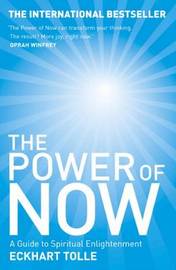

So most of our thoughts are repetitive, stale, negative and useless. Yet we cannot really predict the future or change the past. It is caused by our thinking, which make us anxious about the future or regretful about the past. Much of the suffering that we experience is unnecessary.

The Buddha described enlightenment as simply the end of suffering.

The subtitle of this book is “A Guide to Spiritual Enlightenment.” Most of us probably see enlightenment as some impossible achievement, but Eckhart Tolle says it is not. Watch Your Thoughts: Creating space from our nonstop mental chatter The book hit the bestseller lists and become a huge influence.ġ. Only 3,000 copies of the book were originally published, but 5 years years later Oprah discovered and heavily promoted it. The Power of Now was based on those talks. He began giving talks and answering questions for spiritual seekers.

He discovered it was a type of spiritual experience that many past religious teachers wrote about. Later Eckhart tried to understand what happened to him. He famously spent a couple years sitting on park benches fully content with his life. Then at age 29, Eckhart had a spiritual breakthrough that gave him deep inner peace. He was miserable, suffering from anxiety and suicidal depression. Who is Eckhart Tolle?Įckhart Tolle (author site) was born in Germany and educated in England at the University of London and Cambridge University. You can immediately apply most of his ideas and you will shift your focus or experience of life, even as you’re reading the book. But Eckhart Tolle is almost always saying things that are meant to be practical. I believe some people misunderstand this book’s message because they see it as abstract philosophy. Looking back, I now understand this book was essentially my introduction to mindfulness and meditation techniques- Which science has proven to give many benefits for mental and physical health. I was able to move past a lot of the strong anxiety that I felt because I had created space between myself and my neurotic negative thinking. And guess what? They really did make my immediate experience of life very different. I tried some of Eckhart Tolle’s exercises for thinking less and living in the present moment. When I was 16 years old, I was a very anxious, neurotic teenager. However, I still think it’s a brilliant book, even if there are a few questionable paragraphs. For example, what does he really mean by “dimensions of consciousness”? And is it really possible for mental practices to make the “molecular structure” of your body less dense, as he claims? While reading The Power of Now, sometimes it is hard not to be distracted by the very “new agey” language that Eckhart Tolle uses. I can see where the criticism of this book comes from. Many others say it is a book of nonsense ramblings. Many people say The Power of Now changed their life and helped them have more inner peace.


 0 kommentar(er)
0 kommentar(er)
